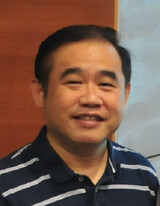CIPK15-mediated inhibition of NH4+ transport protects Arabidopsis from submergence
Ammonium (NH4+) serves as a vital nitrogen source for plants, but it can turn toxic when it accumulates in excessive amounts. Toxicity is aggravated under hypoxic/anaerobic conditions, e.g., during flooding or submergence, due to a lower assimilation capacity. AMT1; 1 mediates NH4+ uptake into roots. Under conditions of oxygen-deficiency, i.e., submergence, the CBL-interacting protein kinase OsCIPK15 has been shown to trigger SnRK1A signaling, promoting starch mobilization, thereby the increasing availability of ATP, reduction equivalents and acceptors for NH4+ assimilation in rice. Our previous study in Arabidopsis demonstrates that AtCIPK15 phosphorylates AMT1; 1 whose activity is under allosteric feedback control by phosphorylation of T460 in the cytosolic C-terminus. Here we show that submergence cause higher NH4+ accumulation in wild-type, plant but not of nitrate, nor in a quadruple amt knock-out mutant. In addition, submergence triggers rapid accumulation of AtAMT1;1 and AtCIPK15 transcripts as well as AMT1 phosphorylation. Significantly, cipk15 knock-out mutants do not exhibit an increase in AMT1 phosphorylation; however, they do display heightened sensitivity to submergence. These findings suggest that CIPK15 suppresses AMT activity, resulting in decreased NH4+ accumulation during submergence, a period when NH4+ assimilation capacity may be impaired.
Kuo-Chen Yeh
Distinguished Research Fellow and Director
(02) 2787-2056
kcyeh@gate.sinica.edu.tw
A529, Agricultural Technology Building
Lab.
A526, Agricultural Technology Building
Tel: (02) 2787-2054
Director (2019.1.16-present)
Interim Director (2016.10.1 -2019.1.15)
Director/Coordinator of Molecular and Biological Agricultural Sciences program of Taiwan International Graduate Program (TIGP-MBAS), Academia Sinica (2015-2020)
Distinguished Research Fellow (2024-present)
Research Fellow (2014-2024)
Associate Research Fellow (2009-2013)
Assistant Research Fellow (2001-2009)
PDF Howard Hughes Medical Institute and Department of Biological Sciences, Stanford University, USA (1999-2001)
Ph.D. Plant Biology Graduate Group, University of California, Davis, USA (1994-1999)

